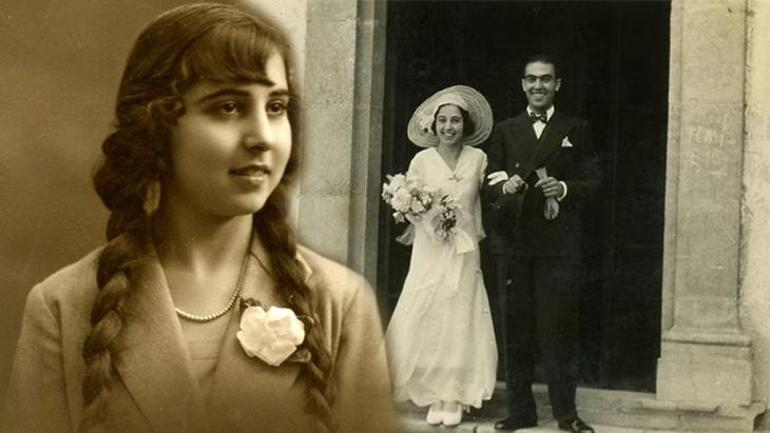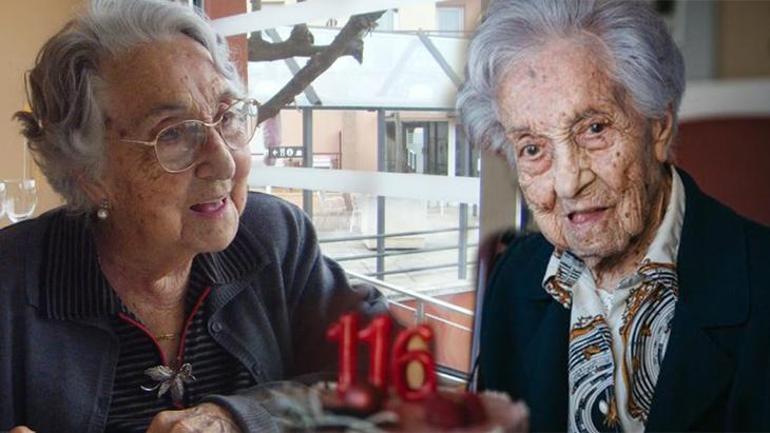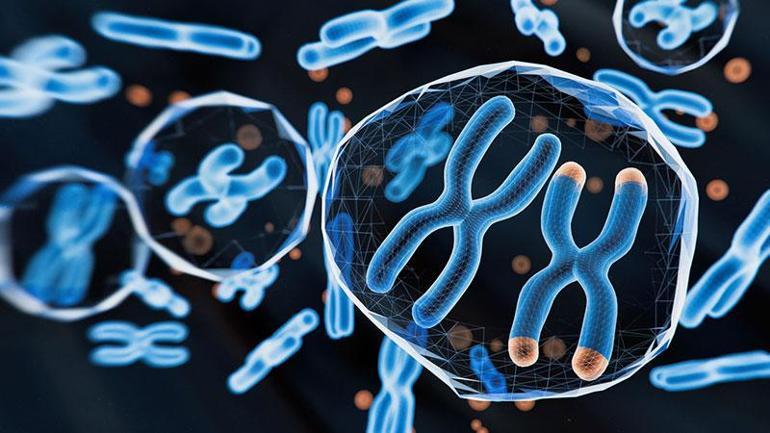He lived a healthy 117 years! This is how he survived two wars and a pandemic: 'If it was poisonous, I didn't keep it in my life'

Betül Yasemin Kökbek / Milliyet.com.tr - Born on March 4, 1907, in San Francisco, USA, Maria Branyas Morera had no idea at birth that she would live a life that would be recorded in the Guinness Book of World Records and passed down by word of mouth after her death. Born to Catalan immigrants, Maria returned to Spain with her family at a young age and spent her childhood in Barcelona. Interested in music and literature from a young age, Morera pursued a successful education . Witnessing some of the most turbulent periods of the 20th century, Morera experienced the suffering of war firsthand, volunteering in the healthcare field during the Spanish Civil War. Surviving two world wars and two pandemics throughout her life, Morera struggled to maintain her positivity and loving perspective on the world, despite all the suffering she witnessed. Marrying the man she loved and having three children, Maria Branyas Morera was deeply involved in the education of both her children and the grandchildren born over the years. Unlike many of her peers, Maria Branyas Morera lived a long and healthy life. Although she witnessed countless wars, epidemics, and suffering throughout her century-long life, the philosophy she embraced throughout her life earned her the title of "longest-living person" until 2024.

THEY EXAMINED HIM WHILE HE WAS ALIVE
Born in 1907 and living to be 117 years old, Maria Branyas Morera accepted an offer from researchers in Barcelona, Spain, to share her life's secrets just one year before her death. The researchers began by examining her gut microbiome. The study revealed that Ms. Morera had an exceptionally healthy gut, and her cells functioned as if she were 17 years younger than her age. She explained that one of the factors that helped her live so long was surrounding herself only with loved ones and avoiding toxic people.
In an interview before his death, Morera said that the secret to his long life was staying away from cigarettes and alcohol, walking every day, following a diet rich in fruits and vegetables, and eating yogurt three times a day.
After years of defying analysis, Morera's gut microbiome was subjected to a series of genetic studies by geneticist Dr. Manel Esteller. Dr. Esteller and his team collected blood, saliva, urine, and stool samples. These samples revealed a wealth of information about Branyas's remarkable physiology, including her genetics, metabolism, and gut microbiome. " The general rule is that we get sicker as we get older," Dr. Manel Esteller said. "But Maria Branyas Morera was an exception, and we wanted to understand why. For the first time, we were able to distinguish between old age and sickness ." The research team found that Branyas's telomeres (the caps at the ends of DNA that protect the genetic information in DNA) were extraordinarily short. Telomeres naturally shorten with age, and unusually short telomeres are associated with age-related diseases. However, Branyas did not have such a condition. " This shows us that telomere loss is not necessarily associated with disease, but simply with aging," Dr. Manel Esteller explained.

Morera, who has witnessed wars and epidemics, contracted coronavirus at the beginning of the COVID-19 pandemic in 2020 and became the oldest person to recover from the disease in 2021. Regarding the pandemic, which she overcame at the age of 117, she said: "Life is not eternal for anyone. At my age, a new year is a gift, a humble celebration, a new adventure, a beautiful journey, a moment of happiness. Let's enjoy life together."
HE EATS A MEDITERRANEAN-STYLE DIET AND SPENT TIME FOR HOBBY
The study also found that Morera's genome displayed exceptionally youthful characteristics for his age, highlighting his low levels of inflammation and strong cardiovascular structure. It was also reported that Branyas had very high levels of good cholesterol and very low levels of bad cholesterol and triglycerides. Experts who closely examined his DNA also revealed gene variants that protect heart and brain cells from disease and dementia. The secret to his 117-year life wasn't just his genes; Morera, who ate a Mediterranean diet, prioritized his social life, maintained physical activity, and embraced a lifestyle that included dedicating time to his hobbies. His life, which was the subject of studies investigating the secret to his longevity, sadly ended on August 19, 2024, without any illness. Morera, who passed away at the age of 117, still remains a topic of discussion today, having lived for over a century.
We asked Medical Biology and Genetics Specialist Prof. Dr. Korkut Ulucan about the supporting factors for living long and healthy and whether longevity is a trait that lies in our genes.
According to Korkut Ulucan, gene variants, or polymorphisms, provide us with information about a wide range of metabolic events, including individuals' adaptation to their environment, health status, disease predisposition, nutritional habits, and mood disorders. Prof. Dr. Korkut Ulucan says, " Especially recently, within the scope of 'longevity,' the identification and evaluation of these genetic variants, their relationship to epigenetic pathways, and their holistic evaluation through a variety of tests, such as microbiota, have become increasingly important ." In this context, numerous studies have proven that genetic variants that protect against cardiovascular disease, beneficial gene variants that regulate the immune system, and nutritional patterns appropriate for our genetic makeup are associated with longevity and a healthy life. Prof. Dr. Korkut Ulucan emphasized that numerous studies support the fact that gene variants that protect against disease and enhance resistance to stress offer significant benefits to individuals in terms of healthy living.

IS THE SECRET HIDDEN IN YOUR TELOMERES?
Prof. Dr. Korkut Ulucan made the following statements regarding the examination of the telomeres of Maria Branyas Morera, who lived for 117 years:
Telomeres are repeating units formed by the sequential arrangement of specific nucleotides, the building blocks of our DNA, located at the ends of the chromosomes that carry our genes. Every time our cells divide, shortening and loss occur in the regions at the ends of the chromosomes. When this shortening reaches a certain level, the chromosomes begin to lose their function. The cell loses its function and ends its life in a programmed manner. This characteristic also ensures the balance between the formation of new cells in tissues and the death of old and worn-out cells. However, the size of telomere structures is different for each individual, provided that they do not fall below a certain number of repeats, and they can even vary within cells from the same tissue within an individual. Telomere length may not always be associated with health, but it is considered one of the markers of a healthy life. If we knew the telomere length of cells obtained from Maria Branyas Morera's cells from the same tissues, perhaps 20-30 years ago, or even a year ago, then we could make a more precise interpretation. Individuals' telomere lengths and telomere shortening vary, and each individual should be evaluated on a case-by-case basis. Even short-term telomere lengths are not always related to health. In some cases, telomeres may also prevent the development of diseases such as cancer."
Now, let's look at the impact of our genetic factors on longevity. If there are people in your family who have lived over 100 years, you might believe that longevity is in your genes and that you'll live a long time. But is this really the case? Prof. Dr. Ulucan explained that it's not easy to determine the proportions or percentage contributions of the factors that influence individual lifespans, and continued: " It would be quite bold to say that this much is genetic and that much is environmental and epigenetic. However, for a quality and healthy life, we must adapt our environmental factors to our genetic makeup. For example, our genetic makeup tells us what precautions to take against sleep patterns and hours, diet, and stress; we just need to evaluate them carefully."

WHAT DOES THE DIFFERENCE IN THEIR DNA TELL US?
After nearly a century of life, Maria Branyas Morera, whose values were examined, explains that not only did she consciously choose and practice a healthy lifestyle, but she also had certain characteristics in her genes. So, what exactly is the difference in Morera's DNA? Prof. Dr. Ulucan shared that since he doesn't have the genetic data, it's not safe to say anything definitive. However, from the study report, he can understand that the individual's DNA contains variants that protect against cancer and cardiovascular disease. Prof. Dr. Ulucan explained, " Variants that cause the immune system to function more regulated may have been more prominent in Morera. These genes can support the fight against cancer or keep the immune system more vigorous. We all have these genes, but we all carry variants of these genes. This means this individual has gene variants that can cause these metabolisms, perhaps lower blood lipids, and greater resistance to stress conditions. Previous studies on longevity have reported the identification of gene variants that support these metabolisms. Therefore, such studies are invaluable to us ."
We may have much to learn from the life experiences of Morera, who passed away last year. Therefore, studies based on his values can guide us. Is the secret to longevity tied to external factors or genetics? If so, can the information obtained from long-lived individuals like Morera be applied to the general population? According to Prof. Dr. Korkut Ulucan, the answer is "yes." Prof. Dr. Ulucan concluded by saying, "At the very least, it is possible to determine which genetic variants are present in individuals who live long and high-quality lives. When evaluated alongside information about their lifestyles, such as nutrition, exercise, and sleep patterns, similar lifestyle programs can be implemented in individuals with the same gene variants, enabling the development of the keys to a high-quality life. In individuals without the same genetic variants, potential metabolic differences can be predicted, and epigenetic approaches may be used to create metabolic structures similar to those of individuals who live long and healthy lives. Therefore, genetic analyses of such individuals are of great importance."
milliyet



